
Chance Theater reinvigorates the 1998 Broadway blockbuster Ragtime to thrilling effect, giving the musical flashback to early-20th-century America race-and-class relations fresh new 21-century relevance.
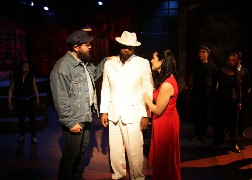 Director Casey Stangl’s simple but excitingly innovative concept has Wyn Moreno (Tateh), Dony Wright (Colehouse Walker, Jr.), and Rachel Oliveros Catalano (Mother) entering an abandoned warehouse in contemporary attire before welcoming an additional sixteen actors to tell stories it took nearly three times their number to accomplish on Broadway, but without need for massive sets, detailed period costumes, or 28-piece orchestra.
Director Casey Stangl’s simple but excitingly innovative concept has Wyn Moreno (Tateh), Dony Wright (Colehouse Walker, Jr.), and Rachel Oliveros Catalano (Mother) entering an abandoned warehouse in contemporary attire before welcoming an additional sixteen actors to tell stories it took nearly three times their number to accomplish on Broadway, but without need for massive sets, detailed period costumes, or 28-piece orchestra.
The characters soon to take shape on Chance’s Cripe Stage are the same remarkable men, women, and children first brought to life by E. L. Doctorow, whose 1975 novel recalled an era of historic change in the United States, a time when turn-of-the-20th-century America found itself divided between The Haves (well-to-do White Anglo-Saxon Protestants like Henry Ford and J.P. Morgan, both of whom play cameo roles in Ragtime) and The Have-Nots (working-class African-Americans and fresh-off-the-boat Eastern European immigrants).
The Haves may have wanted to believe that “there were no Negroes and there were no immigrants,” but Ragtime’s fictional Mother, Father, Younger Brother, and Little Boy were soon to find out otherwise.
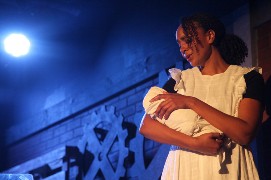 Mother takes in an abandoned African-American baby and the child’s unwed mother Sarah (Jennifer Talton);
Mother takes in an abandoned African-American baby and the child’s unwed mother Sarah (Jennifer Talton);
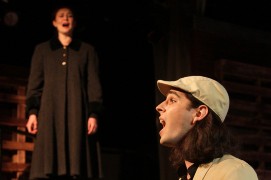 Younger brother (Joseph Bricker) becomes inflamed by anarchist Emma Goldman (Bryce Hamilton) to revolt against the status quo alongside Sarah’s lover, musician Coalhouse Walker, Jr.;
Younger brother (Joseph Bricker) becomes inflamed by anarchist Emma Goldman (Bryce Hamilton) to revolt against the status quo alongside Sarah’s lover, musician Coalhouse Walker, Jr.;
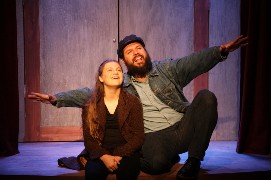 and Mother’s life becomes intertwined with those of Eastern European immigrant Tateh and his young daughter Little Girl (Rebeka Hoblik) in addition to those already present in her own: Father (Ron Hastings), Grandfather (Glenn Koppel), and Little Boy (Brendan Knox).
and Mother’s life becomes intertwined with those of Eastern European immigrant Tateh and his young daughter Little Girl (Rebeka Hoblik) in addition to those already present in her own: Father (Ron Hastings), Grandfather (Glenn Koppel), and Little Boy (Brendan Knox).
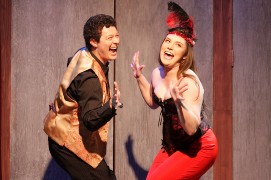 Ragtime manages to be both epic in its cast of major historical figures like illusionist Harry Houdini (Matt Takahashi), chorus girl Evelyn Nesbitt (Sarah Pierce), auto mogul Ford (Hastings), financier Morgan (Koppel), and African-American educator Booker T. Washington (Jabriel Shelton) and personal in its focus on Coalhouse’s efforts to win Sarah back, on Tateh and his daughter’s first steps towards becoming Americans, and on Mother’s growing disillusionment with her marriage.
Ragtime manages to be both epic in its cast of major historical figures like illusionist Harry Houdini (Matt Takahashi), chorus girl Evelyn Nesbitt (Sarah Pierce), auto mogul Ford (Hastings), financier Morgan (Koppel), and African-American educator Booker T. Washington (Jabriel Shelton) and personal in its focus on Coalhouse’s efforts to win Sarah back, on Tateh and his daughter’s first steps towards becoming Americans, and on Mother’s growing disillusionment with her marriage.
If all these plot threads seem daunting in synopsis, McNally’s compelling book makes each thread surprisingly easy to follow.
More significantly, Ragtime shines a light on a) where we were vis-à-vis class-and-race relations a century ago, b) how far we have come since then, and c) how far we as a country have yet to go.
Whereas previous Ragtimes have placed the emphasis squarely on the past and allowed audiences to make their own connections to the present, director Stangl’s play-within-a-play conceit makes the musical’s contemporary relevance crystal-clear.
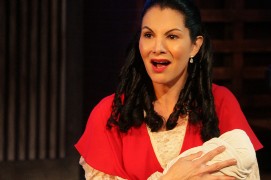 Only Moreno, Wright, and Catalano remain in single-character mode throughout, and since it’s been made clear from the start that what we’re seeing is an assembly of “actors” coming together to tell a story that bears retelling, it doesn’t matter that women occasionally play men, or that racial lines get blurred, or that Asian-Americans get added to a mix that has traditionally excluded them.
Only Moreno, Wright, and Catalano remain in single-character mode throughout, and since it’s been made clear from the start that what we’re seeing is an assembly of “actors” coming together to tell a story that bears retelling, it doesn’t matter that women occasionally play men, or that racial lines get blurred, or that Asian-Americans get added to a mix that has traditionally excluded them.
And lest you fear that storytelling clarity might be lost along the way, quite the opposite proves to be the case.
Not only does Lynn Ahrens and Stephen Flaherty’s Tony-winning score get sung by a vocally blessed cast, choreographer Kelly Todd dazzles throughout, reinventing production numbers like “Crime Of The Century,” “Henry Ford,” and “Atlantic City” as director Stangl turns “What A Game” into a gender-blind celebration of America’s pastime and “Back To Before” into a full-female-cast declaration of #metoo solidarity.
Moreno’s warm and winning Tateh, Wright’s power-piped Coalhouse, and Catalano’s complex, compassionate Mother anchor a production that doesn’t have a weak link in it.
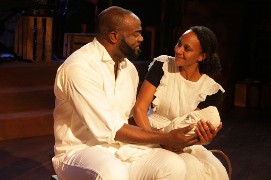 Talton (an exquisite, heartbreaking Sarah), Bricker (an impassioned Younger Brother), Hamilton (a fiery Emma), Knox (a smart, precocious Little Boy), Koppel (a curmudgeonly Grandfather), Pierce (a saucy Evelyn), Hoblik (a charming Little Girl), Shelton (a spirited Booker T.), and fight captain Takahashi (a charismatic Houdini) excel in multiple roles as do Hastings and Jake Burnett (Willie Conklin) as men whose male chauvinism and racism stems more from their era and social station than innate character defects.
Talton (an exquisite, heartbreaking Sarah), Bricker (an impassioned Younger Brother), Hamilton (a fiery Emma), Knox (a smart, precocious Little Boy), Koppel (a curmudgeonly Grandfather), Pierce (a saucy Evelyn), Hoblik (a charming Little Girl), Shelton (a spirited Booker T.), and fight captain Takahashi (a charismatic Houdini) excel in multiple roles as do Hastings and Jake Burnett (Willie Conklin) as men whose male chauvinism and racism stems more from their era and social station than innate character defects.
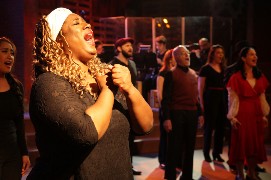 Yunga Webb (Sarah’s Friend) sings “Till We Reach That Day” with as much spine-tingling, rafters-reaching power as it’s ever been sung, dance captain Sydney DeMaria, Christianne Holly Santiago, and Kristin Yata provide expert ensemble support throughout, and child cutie Ausar Landon Wright shows up at the end as Coalhouse Jr.
Yunga Webb (Sarah’s Friend) sings “Till We Reach That Day” with as much spine-tingling, rafters-reaching power as it’s ever been sung, dance captain Sydney DeMaria, Christianne Holly Santiago, and Kristin Yata provide expert ensemble support throughout, and child cutie Ausar Landon Wright shows up at the end as Coalhouse Jr.
Musical director Robyn Manion merits her own cheers for helping to shape cast vocals and harmonies while tickling the ivories virtually nonstop in Ragtime’s pitch-perfect onstage orchestra*.
Last but not least, Christopher Scott Murillo earns kudos for his expansive warehouse/theater set as do Wendell C. Carmichael for his inventive costume design, Wesley Charles Chew for his vibrant lighting, Ryan Brodkin’s for his expert sound design mix, and Danthi Tran for her myriad properties.
Nicole Koenig is assistant director. Nicole Schlitt is stage manager and Gavin Lattimer is assistant stage manager. Moreno doubles as dialect coach and fight choreographer. Sophie Hall Cripe is dramaturg.
L.A./OC theatergoers can now add Ragtime to Chance Theater’s long list of summer-musical hits, an inspired concept executed with equal parts passionate commitment and artistic command.
*Jimmy Beale, Manion, Jonathan Proctor, Saul Reynoso, Julian Rymar, Jorge Zuniga
Chance Theater, 5522 E. La Palma Ave., Anaheim Hills.
www.chancetheater.com
–Steven Stanley
July 6, 2019
Photos: Doug Catiller/True Image Studio
Tags: Chance Theater, Lynn Ahrens, Orange County Theater Review, Stephen Flaherty, Terrence McNally



 Since 2007, Steven Stanley's StageSceneLA.com has spotlighted the best in Southern California theater via reviews, interviews, and its annual StageSceneLA Scenies.
Since 2007, Steven Stanley's StageSceneLA.com has spotlighted the best in Southern California theater via reviews, interviews, and its annual StageSceneLA Scenies.







 COPYRIGHT 2024 STEVEN STANLEY :: DESIGN BY
COPYRIGHT 2024 STEVEN STANLEY :: DESIGN BY